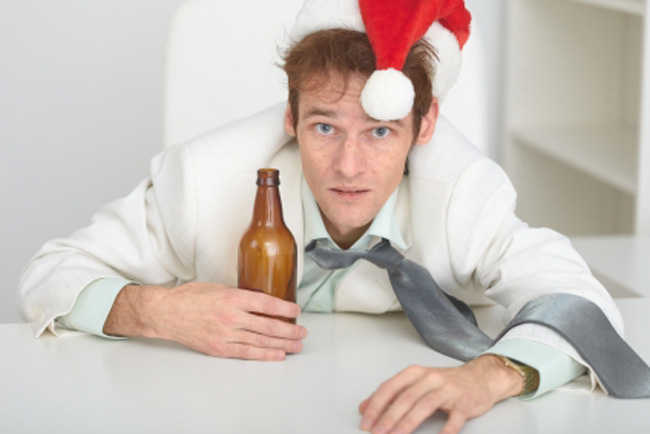Hangover Cures: What Works, What Doesn't

'Tis the season to indulge. 'Tis also the season to scour the Internet for some quick fix for the pounding headache and acute sensitivity to all things louder than a fruit fly, brought on by the previous night's adventure with alcohol.
But you've heard it before. Nothing will heal you of that hangover other than time.
If something really worked, you would know about it by now. As with Viagra, you'd be seeing TV commercials for this million-dollar blockbuster cure during football games. The pursuit of a legitimate cure is, in fact, purely commercial, for most medical researchers do not see the hangover as an ill to cure but rather nature's way of stopping us from abusing alcohol.
While numerous studies have revealed promising effects from extracts of this herb or that, such as asparagus leaves, and while electrolyzed-reduced water has helped drunk rats feel better, God bless them, we're still a long way from a hangover cure.
The most sobering study was published in the British Medical Journal in 2005, a systematic review of dozens of so-called cures, as benign as walking in fresh air (unless you live in Los Angeles) and as mysterious as Russia Party (likely a nutrient supplement, but my search engine warned me not to go further). The conclusion? Nothing tested thoroughly works.
Even more sobering is the fact that the precise cause of the hangover, other than the obvious drinking that preceded it, is unknown. Dehydration is a factor but likely not the primary cause.
Here are some pros and cons of purported cures.
Get the world’s most fascinating discoveries delivered straight to your inbox.
Hair of the dog: Drinking a little more alcohol in the morning — be it a bloody Mary or otherwise — might provide the mild numbing effect to ease you back. But you should fight that temptation. As relayed in Current Drug Abuse Reviews in January 2009, drinking in the morning to forget the night before is a key indicator of a drinking problem. Those who routinely reveled in the hair of the dog that bit them drank 2 to 3 times more alcohol than other adults in the study, and they had significantly higher rates of alcohol dependency. Ultimately you're just prolonging your misery. Your liver still needs to break down the hangover-inducing toxins in your morning brew.
Anything with "hangover" in the name: If it says it cures hangovers, it doesn't cure hangovers. The best part of these pills and powders is the water you're drinking to chase them down. Some products recommend a full glass with each dose. The more water the better. Yet none of these potions are more effective than a multivitamin, which itself is only marginally useful.
Good breakfast: A good meal can do wonders, particularly if you have it while drinking. But there's still hope the next morning. Eggs contain cysteine, which in theory could help the liver breakdown the toxin acetaldehyde, a byproduct from the previous night's abuse. No studies support this, though. Bananas and kiwi replenish the body with the potassium it craves, lost during the many trips to the toilet the night before. The fructose in fruit and juice doesn't seem to be a magic bullet, but juice does hydrate, which is helpful. Burnt toast, often recommended, won't work. The burnt carbon isn't the same as activated carbon and doesn't filter alcohol.
Headache pills: Ah, your headache is gone. But your liver took some more abuse, particularly if you are using acetaminophen, as is found in Tylenol. Acetaminophen is by far the most common cause of liver failure in the United States, and combined with alcohol it can be deadly. One or two pills are usually safe, depending on the amount of alcohol in your system. Aspirin can be helpful before sleep and upon rising with plenty of water, but only in moderation. Aspirin, a blood thinner like alcohol, spares your liver but increases the risk of bleeding in your stomach and gastrointestinal tract. If your body is sensitive to aspirin, it will hate it while drunk.
Coffee: Well, you cured one of the symptoms. You're awake. Only now you're intensely aware you have a hangover. Coffee, a vasoconstrictor, temporarily can improve your headache by decreasing the size of blood vessels. This counteracts the effects of alcohol, bringing you closer to equilibrium. Then again, coffee can make you edgy and actually can cause headaches for some people. Also, like alcohol, coffee is a diuretic, making you even more dehydrated and increasing the severity of the hangover. When the caffeine wears off, you will be even more tired.
Better genes: If you're lucky, you might among the elite 23 percent of the human gene pool with a natural resistance to hangovers, according to a study published in 2008 in Current Drug Abuse Reviews. Then again, you might be worse off without the protective warning that hangovers offer. The same study found that people who overestimate the level they can drink without getting a hangover are more prone to alcoholism. No pain, no gain.
Propranolol: Propranolol is beta-blocker drug for hypertension that also is commonly used to relieve hangover pain. The bad news is that it doesn't work, according to numerous studies. The good news is that you wasted your money on Propranolol instead of more booze.
Sleep: Sleep is the best cure for a hangover, but for many people this is a luxury. Who has time to sleep when you have to work the next day or, worse, have to clean up from the party and get the smell of human urine out of the sofa?
The punch line is that the day after heavy drinking will always be miserable, no matter what you try, and the only solution is to not get so drunk in the first place — well, at least until scientists get their act together and create a pill to end hangovers. Don't count on that while you're counting down the seconds this New Year's Eve.
- 5 Big Fat Holiday Health Lies
- 7 Solid Health Tips That No Longer Apply
- Medical Myths Even Doctors Believe

Christopher Wanjek is a Live Science contributor and a health and science writer. He is the author of three science books: Spacefarers (2020), Food at Work (2005) and Bad Medicine (2003). His "Food at Work" book and project, concerning workers' health, safety and productivity, was commissioned by the U.N.'s International Labor Organization. For Live Science, Christopher covers public health, nutrition and biology, and he has written extensively for The Washington Post and Sky & Telescope among others, as well as for the NASA Goddard Space Flight Center, where he was a senior writer. Christopher holds a Master of Health degree from Harvard School of Public Health and a degree in journalism from Temple University.
 Live Science Plus
Live Science Plus





